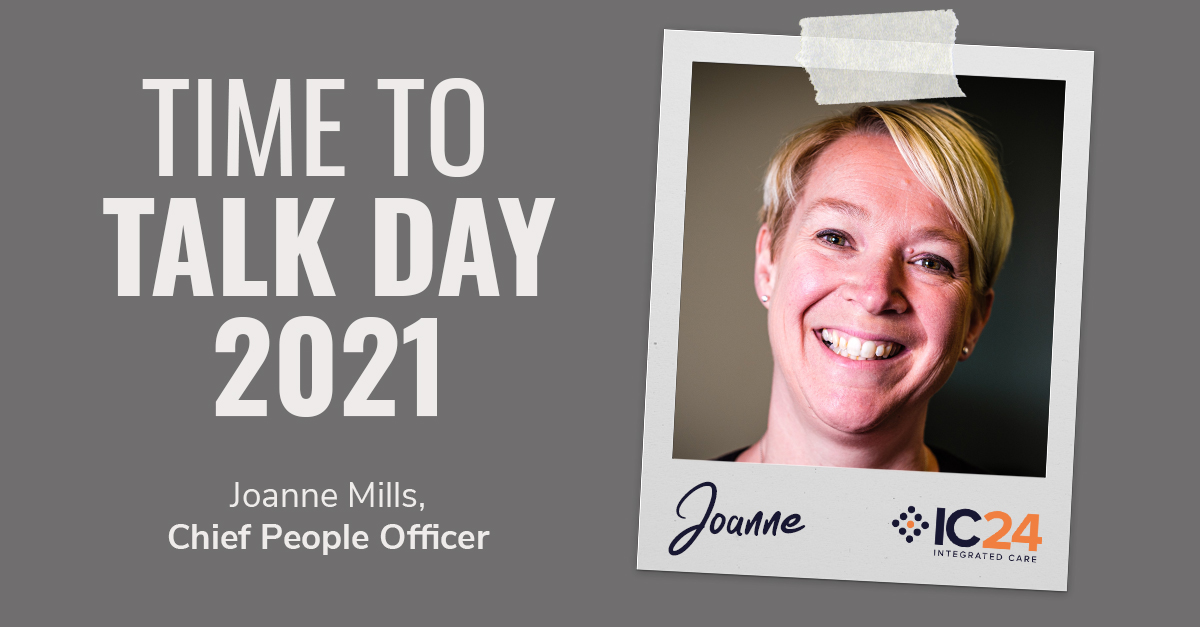Time to Talk Day 2021
A small conversation about mental health has the power to make a big difference. Jo Mills, Chief People Officer at IC24, discusses how important it is to talk about mental health in the workplace and explains some of the wellbeing programmes we have in place at IC24.
by Jo Mills - Chief People Officer

Time to Talk Day 2021 - Jo Mills
What is Time to Talk Day?
We know that the more conversations we have about mental health, the more we can break down barriers. Each year, Time to Talk Day invites the nation to come together to talk about mental health. 2020 was a difficult year for many, so this year's event may be more important than ever.
How can you get involved?
Awareness of mental health is increasing, but we still face a world where people are scared to talk about mental health at work. When we create workplace cultures where people can be themselves, it’s easier for people to speak about these concerns without fear. Time to Talk Day encourages us to speak up about our mental health, here’s a couple of tips for giving others support:
Put yourself in their shoes – When someone opens up it’s important to listen. But, to get things started, sometimes it can be a good idea to share your own feelings and experiences. This can be as simple as sharing something that makes you worry and is a clear way of showing that you’re open to talking about feelings without judgement.
Ask twice – Sometimes we say we’re fine when we’re not. Most of us hear “How are you?” several times a day, and sometimes it can be hard to answer this truthfully. Asking twice is a simple and effective way of showing our loved ones and colleagues that we are ready to listen.
Don’t try to fix it – It can be difficult to see someone you care about having a tough time but try to resist offering fixes to what they’re going through. Learning to manage a mental health problem can be a lengthy journey and they’re likely to have considered a range of strategies. Sometimes, just talking can be incredibly helpful, so unless they’ve asked for advice directly, it might be best to just listen.
What you can do as an organisation
For many of us, work is a major part of our lives. It's where we spend much of our time, where we earn our income and often where we make our friends. At IC24, we believe in workplaces where everyone can thrive. Good mental health at work and good management go hand in hand, so here are just a couple of wellbeing programmes we've put into place:
‘Wellbeing Wednesdays’ - During the first lockdown, we were conscious of the problems our people would be facing, such as working from home, childcare arrangements and isolation. To help our people through this difficult time, we started a 12-week wellbeing campaign to promote health and wellbeing across our workforce. Each week we focused on a different area of wellbeing to support our people to lead a healthy lifestyle – both physically and mentally.
Trauma Risk Management (TRiM) - During the pandemic, our contact centre colleagues have experienced an extraordinary period of their careers, working tirelessly on the frontline to care for patients. To offer support, IC24 implemented TRiM to support those who have been exposed to traumatic situations. Trauma Risk Management is a peer delivered risk assessment and ongoing support system, designed specifically to help with traumatic events. The system allows peers to understand reactions to traumatic incidents and to conduct structured risk assessments, aiming to identify people needing early referral to qualified medical support.
Free counselling service – Sometimes it can seem impossible to talk to loved ones or colleagues about a problem and can be easier to talk to someone who doesn’t know you. That’s why each IC24 employee has access to Perkbox’s counselling service, an employee assistance programme that offers 24/7 emotional support, an online health portal, online GP appointments and a library of resources.
Further advice and support
Whether you’re supporting someone with a mental health problem or have one yourself, having the right information is vital. MIND offer a range of resources for further support. Find out more here.